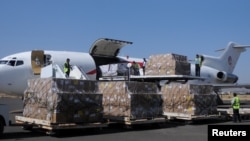The United Nations is appealing for a record $22.5 billion to provide humanitarian assistance to 91 million victims of conflict and natural disasters in 2018.
The money is to be used to give tens of millions of the world's most vulnerable people food, shelter, health care, emergency education, protection and other essential relief next year, according to Mark Lowcock, the U.N. undersecretary-general for humanitarian affairs and emergency relief coordinator.
"The big drivers of humanitarian need for 2018 will continue to be conflict and violence, which forces people to flee from their homes, denies them access to adequate food and robs them of their livelihoods," he said.
The appeal also will be used to provide aid to victims of typhoons, hurricanes and other natural disasters, Lowcock added. But, he says, Yemen, Syria and Democratic Republic of Congo — homes of the world's three biggest crises — will receive most of the aid.
Yemen, the world's largest humanitarian crisis, is in a particularly precarious state because of a blockade imposed by Saudi Arabia following a missile attack on the Saudi capital, Riyadh, on November 6 by Houthi rebels.
"We have been calling for a full unwinding of the blockade, which has been preventing humanitarian assistance and commercial food and fuel [from getting] into Yemen," Lowcock said. "It needs to be fully wound down if we are to avoid an atrocious humanitarian tragedy involving the loss of millions of lives, the like of which the world has not seen for many decades."
Needs next year will remain at exceptionally high levels in Nigeria and South Sudan, and humanitarian crises are expected to grow in Burundi and Cameroon, according to Lowcock.




